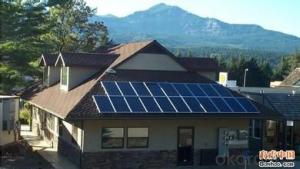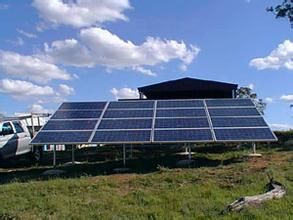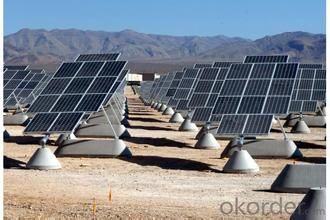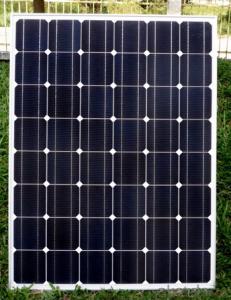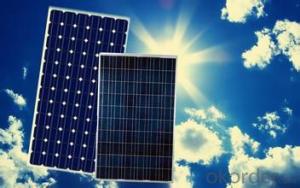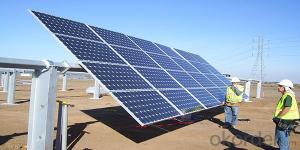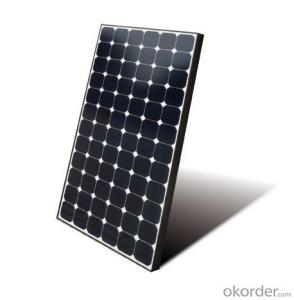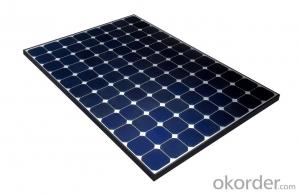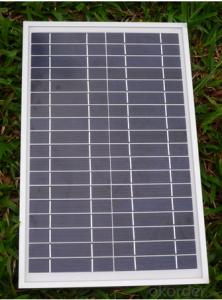Wholesale 80w CNBM Polycrystalline Silicon Solar Panels for Home Use
- Loading Port:
- China main port
- Payment Terms:
- TT OR LC
- Min Order Qty:
- 100 watt
- Supply Capability:
- 1000 watt/month
OKorder Service Pledge
OKorder Financial Service
You Might Also Like
Specification
80W CNBM Polycrystalline Silicon Panel for Home Using
Production description
Most solar modules are currently produced from crystalline silicon (c-Si) solar cells made of multicrystalline andmonocrystalline silicon. In 2013, crystalline silicon accounted for more than 90 percent of worldwide PV production, while the rest of the overall market is made up of thin-film technologies using cadmium telluride, CIGS and amorphous silicon[7]Emerging, third generation solar technologies use advanced thin-film cells. They produce a relatively high-efficiency conversion for the low cost compared to other solar technologies. Also, high-cost, high-efficiency, and close-packed rectangular multi-junction (MJ) cells are preferably used in solar panels on spacecraft, as they offer the highest ratio of generated power per kilogram lifted into space. MJ-cells are compound semiconductors and made of gallium arsenide (GaAs) and other semiconductor materials. Another emerging PV technology using MJ-cells is concentrator photovoltaics (CPV).
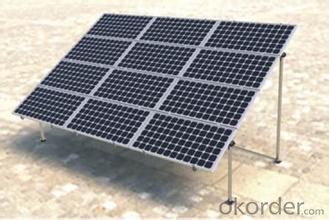
Feature
1.High conversion efficiencies resulting in superior power output performance.
2.Outstanding power output even in low light or high temperature conditions
3.Optimized design for ease of soldering and lamination
4.Long-term stability,reliability and performance
5.Low breakage rate
6.Color uniformaity
Physical characteristic
1. Rigorous quality control meets the highest international standards.
2. High-transmissivity low-iron tempered glass, strong aluminium frame.
3. Using UV-resistant silicon.
4. IS09001/14001/CE/TUV/UL
- Q: Making a solar panelI know there was a recommended wattage for the soldering iron but i cant rememberdoes anyone know?
- How To Solder Solar Cells
- Q: Is it possible to store energy from solar panels for night?
- Yes. okorder /) and informed me of all the incentives I was eligible to receive as well as giving me a break-even analysis, estimated annual savings, and projected return on investment. They are a great resource to begin your solar pursuit. Good Luck!
- Q: Can solar panels be used for powering remote monitoring systems?
- Yes, solar panels can be used to power remote monitoring systems. Solar panels generate electricity from sunlight and can charge batteries or directly power devices. This renewable energy source is ideal for remote locations where access to the electrical grid is limited or unavailable. Solar panels can provide a reliable and sustainable power solution for remote monitoring systems, ensuring continuous operation without the need for frequent battery replacement or reliance on fossil fuels.
- Q: Can solar panels be used off-grid?
- Yes, solar panels can be used off-grid. Off-grid solar systems are designed to generate electricity independently from the utility grid. These systems can store excess energy in batteries for use during times when the sun is not shining or when power is needed at night. Off-grid solar panels are commonly used in remote locations, such as cabins, RVs, boats, and even in developing countries without access to reliable grid electricity.
- Q: I thought that I had a fairly good understanding of watt's law, but i'm starting to doubt myself.If I have a load of 4500watts at 240 volts, how many watts of solar panels do I need, if the solar panels are at 2v?Yes, Yes... I have a charge controller, batteries, etc...So the way I looked at this at first:watts = volts * amps For the load4500 = 240 * xx would be 8.75aFor the power source (each solar panel)00 = 2 * xx would be 8.3a8.75 / 8.3 = 2.25, rounded up = 3So... based on that I came to the conclusion that I needed 3 solar panels...But... then I was thinking. Does it work that way?Or do I need 4500 / 00 = 45, aka 45 solar panels?In other words...If I have a 2v power source, how many watts do I need to drive a load of 4500w at 240v?ThanksMatt
- The easy way is to just use the power values. You need 4500W. Each solar panel delivers 00W (from a value in your working). Therefore you need 4500/00 = 45 solar panels. This is a crude calculation, ignoring efficiencies, voltage conversion losses and losses due to internal resistance. You would probably need quite a few more than 45 panels. ___________________________ I'll explain how to do the calculation your way. Each solar panel delivers 00W with a voltage of 2V. So the current is 00/2 = 8.333A. Each solar panel delivers 8.333A at 2V. But you require 8.75A at 240V panel delivers 00W. To get 4500W, you need: 8.75/8.333 = 2.25 times more panels to increase the current AND 240/2 = 20 times more panels to increase the voltage. So overall you need 2.25 x 20 = 45 panels. Of course if the power output of each solar panel is not 00W, you have to change the above calculation accordingly.
- Q: Solar panels single crystal and double crystal in the rain which is easy to use
- At present, monocrystalline silicon solar cell photoelectric conversion efficiency of about 15%, the highest reached 24%, which is all types of solar cells in the photoelectric conversion efficiency of the highest, but the production cost is so large that it can not be a large number of extensive And commonly used. Since monocrystalline silicon is typically coated with tempered glass and waterproof resin, it is rugged and durable for up to 15 years and up to 25 years.
- Q: This is for my science project and i cannot figure it outWe assumed that blue light shining on a solar panel would give off the higher volt reading because it has the shortest wavelength and the highest energy, but it was actually the lowest. Why does this happen? Im very confused And cant find the answer anywhere.... ,thank you!!
- I okorder /
- Q: Can solar panels be used to power a sports stadium?
- Yes, solar panels can be used to power a sports stadium. By installing a sufficient number of solar panels on the roof or surrounding areas of the stadium, the generated electricity can be used to power various facilities such as lighting, scoreboards, sound systems, and even some of the equipment needed for the sporting events. Additionally, excess energy can be stored in batteries or fed back into the grid, making it a sustainable and cost-effective solution for powering a sports stadium.
- Q: i wanted to buy solar panels but this guy told me one will just power one light bulb what i want to know is how much thay cost and is it true tat if more power leaves your house than goes in the power company has to send u a cheek
- If you want to get money from the power company you will have to basically put in $0k to $20k worth of solar panels. Currently most solar panels that are available to home owners are not all that efficient. I currently have 3 that are 2 foot x 0 foot on my roof that follow the sun and they only power my water heater. Also some states will give you a tax rebate for installing solar power banks on your roof, mainly in the southwest.
- Q: i really need to know howbecause im building a solar powered car for science fair :]thank you!
- You might need some help from the sun.
Send your message to us
Wholesale 80w CNBM Polycrystalline Silicon Solar Panels for Home Use
- Loading Port:
- China main port
- Payment Terms:
- TT OR LC
- Min Order Qty:
- 100 watt
- Supply Capability:
- 1000 watt/month
OKorder Service Pledge
OKorder Financial Service
Similar products
Hot products
Hot Searches
Related keywords
